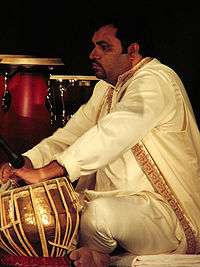Music of Kuwait
Kuwait is well known in the region for its exploration of many different and new forms of music and dance.[1] Kuwait is the birthplace of various popular musical genres such as sawt.[2][3] Kuwait is widely considered the centre of traditional music in the Persian Gulf.[2][3] The Sheikh Jaber Al-Ahmad Cultural Centre is the largest opera house in the Middle East.[4]

History
Kuwait is the birthplace of various popular musical genres, such as sawt.[2][3] Traditional Kuwaiti music is derived from the country's seafaring heritage. In pre-oil times, Kuwait was regionally renowned for its music and 20–30% of Kuwaitis were professional musicians.[5] Kuwait is widely considered the centre of traditional music in the Persian Gulf.[2][3] Traditional Kuwaiti music reflects the cosmopolitan influence of many diverse cultures.[6]
Kuwait's seafaring tradition is known for songs such as "Fidjeri".[7] "Fidjeri" is a musical repertoire performed traditionally by male pearl divers. It involves singing, clapping, drums and dances with earthen water jars. "Liwa" and "Fann at-Tanbura" are types of music performed mainly by Kuwaitis of East African origin. "Al Arda Al Bahariya" is a well-known Kuwaiti sailor song, as are the "al-Nahma", a class of songs that accompanied many sailing activities.
Kuwait pioneered contemporary Khaliji music.[8][9][10] Kuwaitis were the first commercial recording artists in the Gulf region.[8][9][10] The first known Kuwaiti recordings were made between 1912 and 1915.[11] Kuwait is known as the center for sawt, a bluesy style of music made popular in the 1970s. Saleh and Daoud Al-Kuwaity were prominent Kuwaiti musicians who wrote over 650 songs, many of which are considered traditional and still played daily on radio stations both in Kuwait and the rest of the Arab world.[12][13][14]
Kuwait has a reputation for being the central music influence of the GCC countries.[15][16] Over the last decade of satellite television stations, many Kuwaiti musicians have become household names in other Arab countries. For example, Bashar Al Shatty became famous due to Star Academy. Contemporary Kuwaiti music is popular throughout the Arab world. Nawal El Kuwaiti, Nabeel Shoail and Abdallah Al Rowaished are the most popular contemporary performers.[1]
Opera House
The Sheikh Jaber Al-Ahmad Cultural Centre contains the largest opera house in the Middle East.[4] Kuwait is home to various music festivals, including the International Music Festival hosted by the National Council for Culture, Arts and Letters (NCCAL).[17][18] The annual Gulf Music Festival features internationally renowned jazz musicians and local musicians.[19][20]
Education
Kuwait has several academic institutions specializing in university-level music education.[21][22][23] The Higher Institute of Musical Arts was established by the government to provide bachelor's degrees in music.[21][22][23] In addition, the College of Basic Education offers bachelor's degrees in music education.[21][22][23] The Institute of Musical Studies offers degrees equivalent to secondary school.[21][23][22]
See also
References
- Badley, Bill. "Sounds of the Arabian Peninsula". 2000. In Broughton, Simon and Ellingham, Mark with McConnachie, James and Duane, Orla (Ed.), World Music, Vol. 1: Africa, Europe and the Middle East, pp 351-354. Rough Guides Ltd, Penguin Books. ISBN 1-85828-636-0
- Rolf Killius. "The Cradle of Arabic Sawt Music: The Early Musician Generations in Kuwait". Qatar Digital Library.
- Rolf Killius. "Hidden Treasures: Reflections on Traditional Music in Kuwait". Qatar Digital Library.
- "Sheikh Jaber Al Ahmad Cultural Centre". jacc-kw.com.
- "Kuwait's musical heritage: The heartbeat of a nation".
- Sophie Chamas. "Ya Bahr". Brownbook.
- "The Innerworkings of Kuwaiti Pearl Diving: Ghazi AlMulaifi".
- Mustafa Said. "History of Recording in the Gulf area, Part 1". Retrieved 12 March 2016.
- Ulaby, Laith. Performing the Past: Sea Music in the Arab Gulf States (PDF) (PhD). University of California, Los Angeles. p. 99.
- Mustafa Said. "History of Recording in the Gulf area, Part 2". Retrieved 12 March 2016.
- "A Gulfie record collector writes".
- "Jerusalem Diary: 2 March". BBC. 2009-03-02. Retrieved 2016-02-27.
- "Dudu Tassa Makes the Old Iraqi Music of Daoud Al Kuwaiti New in Israel". Tablet Magazine. Retrieved 2016-02-27.
- Urkevich, Lisa (December 12, 2013). "Crossing Paths in the Middle East: Cultural Struggles of Jewish-Kuwaiti Musicians in the 20th Century". American Historical Association. Retrieved February 27, 2016.
- "Culture of Kuwait". Kuwait Embassy in Austria.
- "Opportunity report for Dutch businesses in Gulf region – Creative Industries" (PDF). Government of Netherlands. p. 10.
- "International Music Festival opens in Kuwait" (PDF).
- "Int'l Music Festival opens in Kuwait". Kuwait News Agency.
- "Kuwait Jazz Festival".
- "Gulf Jazz Festival".
- Al-Faraj, Hamed. Kuwait music educators' perspectives regarding the general goals for music education in Kuwait (PhD). Case Western Reserve University. p. 23-26.
- Alderaiwaish, Ahmad. Teaching the Clarinet in Kuwait: Creating A Curriculum for the Public Authority for Applied Education and Training (PDF) (PhD). University of Southampton. p. 51-55.
- Alyoser, Abdulaziz Z. Self-Reported Attitudes and Practices of Music Instructors in Kuwait regarding Adult Music Learners (PhD). Case Western Reserve University. p. 12.